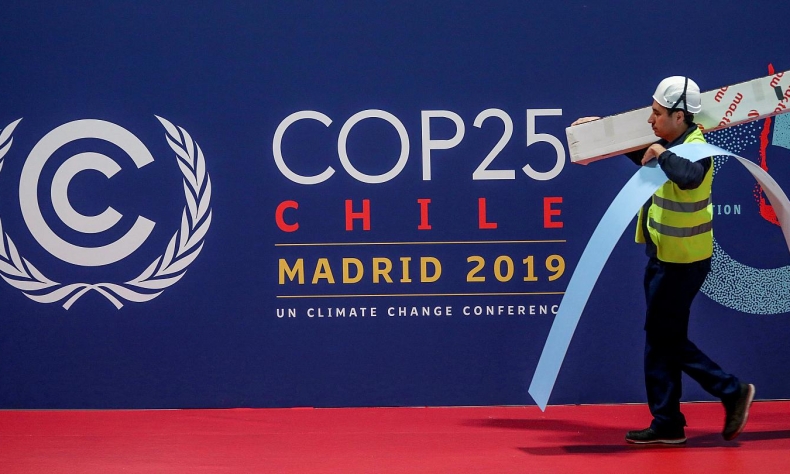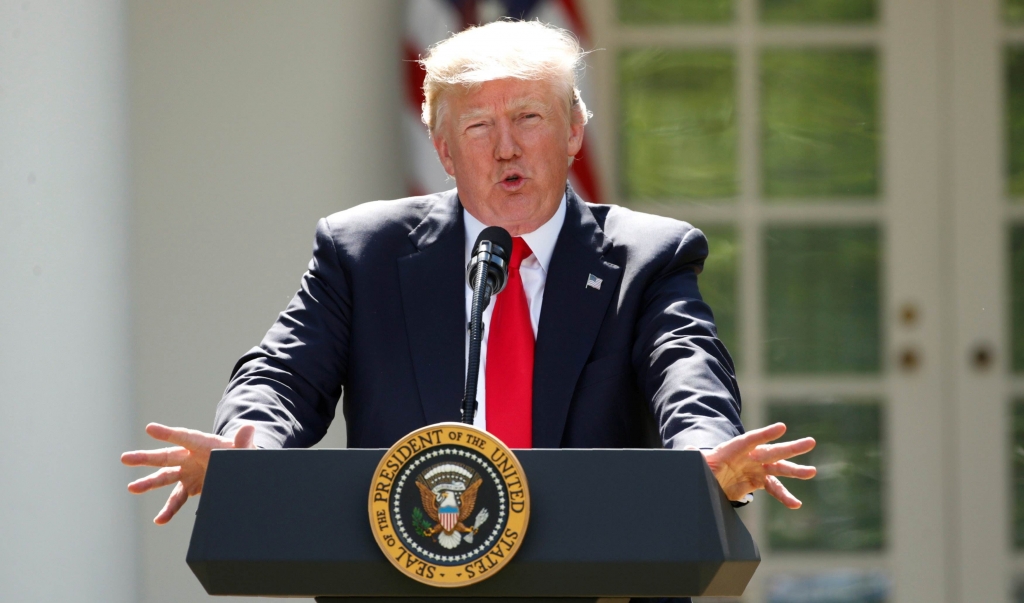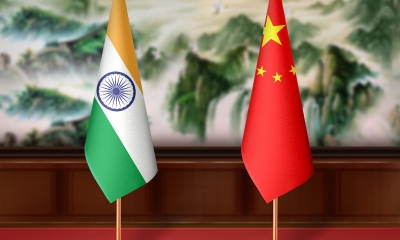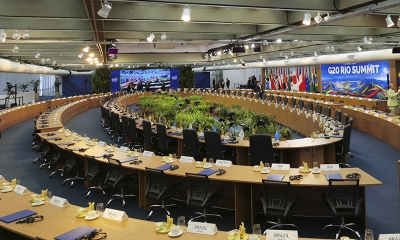China Takes on a Leadership Role at the UN’s Annual Climate Conference

With Trump staying away from the Paris Agreement, China has emerged as the major force in fighting climate change, taking the implementation of the Paris Agreement as an inherent part of its own sustainable development, and has taken decisive actions in this regard, which has resulted in concrete achievements.
In the backdrop of catastrophic effects of climate changes around the globe, from Amazon fires to extreme flooding in North Western Europe, from the fallout of hurricanes in the Tropics to a record of seven cyclones affecting India, the 25th Conference of the Parties (COP25) to the United Nations Framework Convention on Climate Change (UNFCCC) is being held from December 2 to 13 in the Spanish capital, Madrid with a call for action to save the world.
This year’s annual UN climate change conference, the last UN Climate Summit ahead of 2020 where countries are due to submit their updated Nationally Determined Contributions (NDCs), is taking place under the Presidency of the South American country Chile with logistical support from the Government of Spain under the motto of “Time for Action”.
China at the Madrid Climate Change Summit
Leaders and representatives from 200 countries are attending the crucial COP25 where, over two weeks, they will try to salvage a deal to ensure that goals set to reverse rapid global warming are met. The Chinese delegation to this conference is led by Lu Xinming, deputy director general for climate change of the Ministry of Ecology and Environment.
It is expected that the two-week COP25 climate talks may finally yield a consensus on the rules for implementing the much debated Paris Climate Agreement adopted on December 13, 2015, which is a milestone for the world in collectively combating the emissions of greenhouse gases and to accelerate the pursuit of inclusive sustainable development, moving away from planet-warming fossil fuels, like coal, oil and natural gas.
On December 2, asked by the reporters in a press conference at the China Pavilion in Madrid about China’s responsibility in staving off climate change, Lu Xinming reaffirmed that China will try hard to conclude negotiations on the details of the implementation of the Paris Agreement which came into force in late 2016. Using COP25 as a venue for promoting multilateralism, he further added that the trade war with the US won’t have any impact on China’s climate targets.
“One of the most important points is that China opposes any kind of unilateralism and safeguards the authority of multilateralism,” said Lu.
Both China and India, the two most populous countries, at a panel discussion also expressed concern over insufficient funding from developed countries.
It should be noted here that China has also constructively participated in the COP24 in Katowice, Poland last December, proposing “Common but Differentiated Responsibility.”
China’s fulfillment of Paris Agreement
The draft of the landmark Paris Agreement was signed during the Paris Climate Conference (COP21) in December 2015 when the countries agreed to limit global temperature rise to well below 2 degrees Celsius while pursuing efforts to keep temperature rise to 1.5 degrees Celsius. This was followed by another event on April 22, 2016, when 175 countries signed the Paris Agreement at a ceremony in New York. The agreement entered into force on November 4, 2016, 30 days after at least 55 countries – accounting for 55 percent of global greenhouse gas emissions – deposit their instruments of ratification or acceptance with the Secretary-General during the special event on September 21, 2016 organized by the United Nations. As a major player in the climate arena, China was one of the first countries to ratify the Paris Climate Agreement.
But the US President Donald Trump distanced himself from the Paris Agreement and on June 1, 2017, he first announced plans of the US quitting the accord, claiming that climate change was a “hoax” perpetrated by China. And on November 4 this year, his administration formally notified the UN that it would withdraw the United States from the climate accord, citing “an unfair economic burden on American workers and businesses.” But the fact is that the US is already the largest emitter of greenhouse gas per capita in the world. No doubt, Trump’s reneging on the Paris climate deal turns the US into a rogue state.
The US President should keep in mind that fighting climate change is a global consensus, it is not invented by China. China signed the Paris accord because it can safeguard its own environmental and climate problems as well as global interests according to its own capability. On January 17, 2017, Chinese President Xi Jinping defended the Paris Agreement at the World Economic Forum in Davos, Switzerland. “The Paris Agreement is a hard-won achievement which is in keeping with the underlying trend of global development; all signatories should stick to it instead of walking away from it, as this is a responsibility we must assume for future generations,” he said.
Actions speak louder than words. In recent years China has achieved remarkable results and garnered valuable experience in reducing carbon emissions and coping with climate change. Also playing a crucial role to mitigate climate change and other environmental challenges, in 2015, China pledged $3 billion for developing countries to fight climate change. According to China’s 13th Five-Year Plan (2016-20) for the coal industry, being the world’s biggest producer and consumer of the fossil fuel China has pledged to slash coal consumption to below 58 percent by 2020 to reduce pollution and carbon emissions. Recently China has canceled plans for more than 100 new coal-fired power plants, including several that were already under construction and plans to invest at least $360 billion in green-energy projects by 2020. It is important to note that China’s carbon-emissions-per-GDP-unit in 2018 dropped by nearly 46 percent from levels in 2005 which already surpassed the 40 to 45 percent goal set for 2020.
The share of non-fossil fuels in primary energy consumption climbed to 14.3 percent, almost reaching the target of 15 percent. This achievement of carbon emission target has surely provided an important boost to the Paris Agreement.
China’s fight against GHG emission makes a positive impact
China has been playing an enormous role in tackling global climate change as set out in the United Nations Framework Convention on Climate Change, the Kyoto Protocol, the Paris Agreement and their detailed rules of implementation. As Inger Anderson, executive director of the United Nations Environment Program, noted that China “has had a tremendous success in demonstrating climate leadership in recent years” through large investments in clean energy and technologies, electric mobility and wide-scale land restoration.
With Trump staying away from the Paris Agreement, China has emerged as the major force in fighting climate change, taking the implementation of the Paris Agreement as an inherent part of its own sustainable development, and has taken decisive actions in this regard, which has resulted in concrete achievements. President Xi Jinping’s administration adopted “ecological civilization” as its slogan and floated a raft of policies. So far, the results have been good.
While Australia, Saudi Arabia, Poland, Japan and the US – have failed to take strong actions to reduce their CO2 emissions including declining coal consumption, China has improved its global ranking in climate action performance, moving up three spots to rank 30th from last year’s 33rd on the Climate Change Performance Index (CCPI) rankings released during the ongoing COP25 on December 10. On the other hand, the US included in the worst-performing countries for the first time with a rank of 61, thanks to Trump’s agenda against renewable energy.
Notably, China is spending three times as much as the US on renewable energy to meet its commitments, investing $126.6 billion in 2017 alone where the US at $40.5 billion, and creating enough capacity to power the United Kingdom seven times over. While the rest of the world gets an average of 12.3 percent of its electricity from renewables, China has reached 26 percent. All this shows China’s leading role to accelerate the transition to low carbon and to raise ambition to achieve the Paris Agreement goals.
China is at the forefront of global ocean governance
Since oceans are facing increasing pressures due to biodiversity loss, pollution, over-exploitation and illegal activities, as signatories to the Maritime Spatial Planning (MSP), China has been playing a key role in biodiversity conservation in ocean and coastal areas over the 15 years with all the relevant stakeholders. China urged all countries to work together to meet the new challenges and leave a legacy of unpolluted seas and skies for future generations.
Addressing a debate of the UN General Assembly at the UN headquarters in New York on December 10, 2019, China’s deputy permanent representative to the UN, Wu Haitao said, “It is necessary to balance the protection and the sustainable use of oceans and seas to achieve orderly exploitation and use of marine resources. We should develop a blue economy, promote maritime connectivity and practical cooperation in various fields, and jointly build the 21st Century Maritime Silk Road.”
China’s promise for a livable planet
All along China has made a public stance for the battle against climate change. So far China’s performance should encourage other countries, big and small, to honor their respective nationally determined contributions. China’s success in renewable energy auctions, in reducing emissions, in greening the land, in transitioning to a low carbon economy besides winning the battle against pollution and building an ecological civilization with green development concepts has enabled it to win accolades globally. The implementation of Paris Agreement is globally essential to fight climate change. Despite Trump’s rejection of the Paris Agreement, China is on right track to meet the a majority of its Paris goals and become a global climate leader by meeting its targets a decade earlier. It is expected that China will shoulder its due responsibility in the global climate governance.
 Facebook
Facebook
 Twitter
Twitter
 Linkedin
Linkedin
 Google +
Google +










